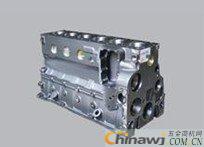**Causes of Early Cylinder Wear and How to Prevent It**
Cylinder wear is a common issue in diesel engines, especially in older or poorly maintained machines. Understanding the reasons behind this problem can help extend the life of your engine and reduce costly repairs. Here are the main causes and prevention tips. 1. **Improper Break-in Period**: New or overhauled engines must go through a proper break-in process before being used. Skipping this step can lead to premature wear on cylinders and other components. 2. **Overloading the Engine**: Running the engine under heavy loads for extended periods increases temperatures, thins the oil, and reduces lubrication. This leads to faster wear on the cylinder liner, piston, and rings. 3. **Prolonged Idle Operation**: Long idle times cause low engine temperatures, poor combustion, and carbon buildup. Additionally, acidic substances may form, leading to corrosion and pitting of the cylinder walls. 4. **Frequent Starting**: Starting the engine multiple times in quick succession can result in dry friction between the cylinder liner, piston, and rings. This accelerates wear and damages internal parts. 5. **Neglected Air Filter Maintenance**: A clogged air filter allows dust and debris into the engine. These particles, especially silica, are harder than steel and cause significant wear on internal components. 6. **Infrequent Oil Changes**: Over time, engine oil degrades and loses its lubricating properties. Contaminants like metal shavings and dirt can cause abrasive wear inside the cylinder. 7. **Fueling During Warm-Up**: Fueling the engine before it's fully warmed up can lead to incomplete combustion and increased carbon deposits, which damage the cylinder. 8. **Starting Without Preheating**: Immediately running the engine at high RPM after starting can cause incomplete combustion and excessive carbon buildup. Let the engine warm up properly first. 9. **Mechanical Issues**: Faulty components such as bent connecting rods, loose or tight fittings, or misaligned parts can cause uneven stress and accelerate cylinder wear. 10. **Incorrect Lubricant Use**: Using the wrong type of oil can lead to poor lubrication and increased friction, resulting in early wear. Always follow the manufacturer’s specifications. 11. **"Humping the Throttle"**: Rapidly increasing and decreasing throttle during shutdown can create uneven fuel-air mixtures, leading to more carbon deposits and cylinder damage. **Prevention Measures** 1. **Proper Break-In**: Ensure all new or overhauled engines undergo a thorough break-in period before full operation. 2. **Regular Filter Maintenance**: Keep air, oil, and fuel filters clean to prevent contaminants from entering the engine. 3. **Timely Oil Changes**: Replace engine oil according to the manufacturer’s recommendations. Clean the oil pan and lubrication system thoroughly when changing oil. 4. **Avoid Adding Water After Start**: Doing so can cause thermal shock and crack the cylinder. 5. **Maintain Proper Operating Temperature**: Keep the engine within 70–80°C for optimal performance. Too low or too high temperatures can lead to wear and corrosion. 6. **Pre-Lubricate Before Starting**: Allow the engine to circulate oil before starting to avoid dry friction. 7. **Warm Up Before Use**: Let the engine run at idle until it reaches around 40°C before putting it under load. 8. **Avoid Overloading**: Don’t run the engine beyond its rated capacity for long periods. 9. **Limit Idle Time**: Prolonged idling leads to poor combustion and carbon buildup. Try to minimize it whenever possible. 10. **Start Correctly**: Avoid forcing the throttle when starting. Let the engine idle for a few minutes before increasing speed. 11. **Avoid Sudden Throttle Changes**: Gradually adjust the throttle when changing load to prevent sudden stress on the engine. 12. **Keep the Engine Clean**: Maintain cleanliness during maintenance to avoid introducing dirt or debris into the engine. 13. **Regular Inspections**: Check piston ring gaps, valve clearance, and fuel injection timing regularly. Address any mechanical issues promptly. By following these guidelines, you can significantly reduce the risk of cylinder wear and improve the longevity of your engine. For more information on engine maintenance, visit [Jinan Scrap Car Engine](http://www.jinanscrapcar.com).

Self-operated Pressure Control Valve
Nitrogen Control Nitrogen Release Valve, Micro Pressure Fluid Control Valve, Industrial Nitrogen Relief Valve,Nitrogen Control Relief Valve
Jiangsu Tanggong Automatic Control Equipment Co., Ltd. , https://www.tgcontrolequipment.com